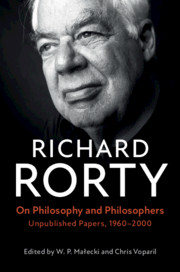Book contents
- On Philosophy and Philosophers
- On Philosophy and Philosophers
- Copyright page
- Contents
- Acknowledgments
- Note on Sources
- Introduction: Rorty as a Critical Philosopher
- I Early Papers
- II Later Papers
- 9 Philosophy as Epistemology: Reply to Hacking and Kim
- 10 Naturalized Epistemology and Norms: Replies to Goldman and Fodor
- 11 The Objectivity of Values
- 12 What Is Dead in Plato
- 13 The Current State of Philosophy in the United States
- 14 Brandom’s Conversationalism: Davidson and Making It Explicit
- 15 Bald Naturalism and McDowell’s Hylomorphism
- 16 Reductionist vs. Neo-Wittgensteinian Semantics
- 17 Remarks on Nishida and Nishitani
- Index of Names
17 - Remarks on Nishida and Nishitani
from II - Later Papers
Published online by Cambridge University Press: 10 October 2020
- On Philosophy and Philosophers
- On Philosophy and Philosophers
- Copyright page
- Contents
- Acknowledgments
- Note on Sources
- Introduction: Rorty as a Critical Philosopher
- I Early Papers
- II Later Papers
- 9 Philosophy as Epistemology: Reply to Hacking and Kim
- 10 Naturalized Epistemology and Norms: Replies to Goldman and Fodor
- 11 The Objectivity of Values
- 12 What Is Dead in Plato
- 13 The Current State of Philosophy in the United States
- 14 Brandom’s Conversationalism: Davidson and Making It Explicit
- 15 Bald Naturalism and McDowell’s Hylomorphism
- 16 Reductionist vs. Neo-Wittgensteinian Semantics
- 17 Remarks on Nishida and Nishitani
- Index of Names
Summary
In “Remarks on Nishida and Nishitani,” Rorty examines Kyoto School philosophers Nishida Kitaro and Nishitani Keiji in relation to the pragmatist tradition. Characterizing their epistemological orientations as the “Argument from Holism to Monism,” Rorty likens their perspectives to the idealism of T. H. Green, F. H. Bradley, and Josiah Royce. He then contrasts those perspectives with the “Argument from Holism to Pragmatism” advanced by William James and John Dewey. He concludes by embracing those aspects of Nishida’s and Nishitani’s positions that are consistent with pragmatism’s “democratic humanism,” but rejecting their traces of transcendence, all while offering one of the more concise accounts of his classical and neopragmatist commitments.
- Type
- Chapter
- Information
- On Philosophy and PhilosophersUnpublished Papers, 1960–2000, pp. 240 - 246Publisher: Cambridge University PressPrint publication year: 2020

